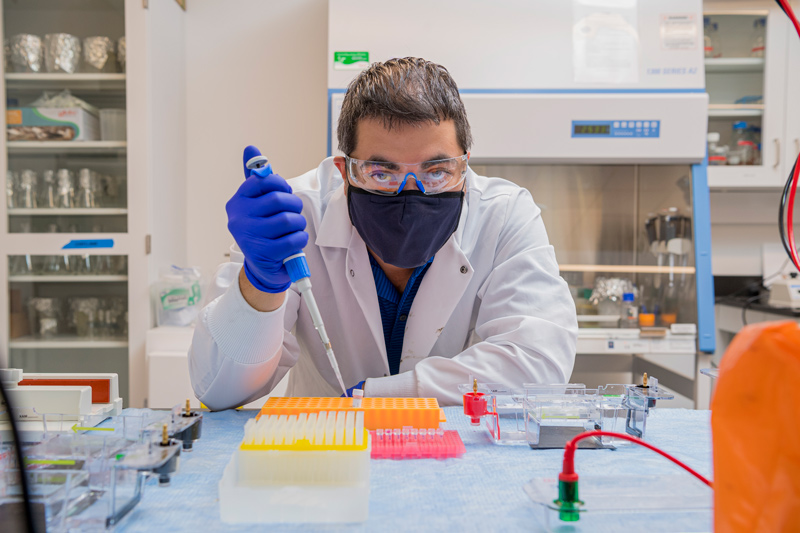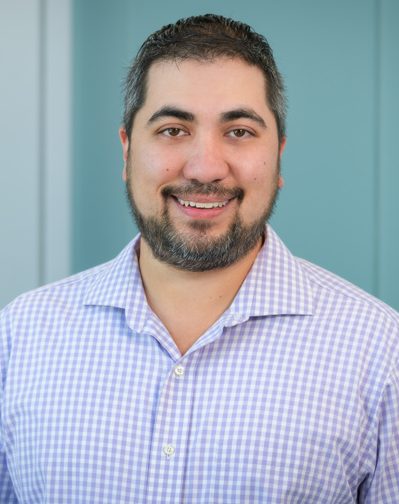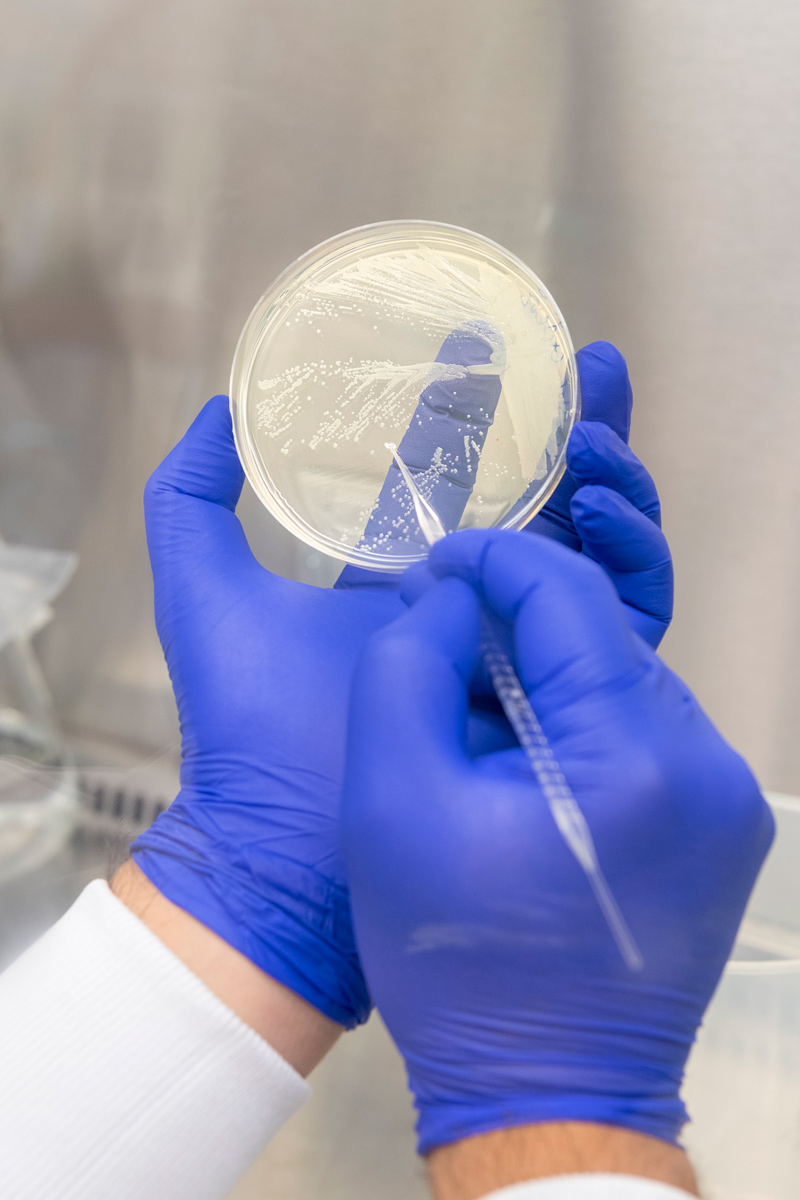


Making the most of yeast
Photos by Kathy F. Atkinson September 15, 2021
UD Prof. Mark Blenner receives prestigious Young Investigator Award
Mark Blenner said he does not think much about his age. When asked recently how young he is, he had to pause to think.
“What year is it again?” he said, only half-joking. “Once you hit 30, you stop counting.”
While Blenner may not care much about his Generation Y status, others are taking notice. This is because, at the age of only — he did eventually remember — 39, the associate professor of chemical and biomolecular engineering at the University of Delaware has already made pioneering advancements in his field… some of them with a decidedly sci-fi feel. In April, in recognition of these outstanding achievements, Blenner received the prestigious Young Investigator Award from the American Chemical Society’s BIOT, or biochemical technology division, an honor reserved for researchers under 40.

“If I had to sum it up in one sentence, I’d say I engineer cells to be better at making stuff,” Blenner said about his body of work to date. “And that stuff is used to address all kinds of problems.”
Specifically, Blenner works with yeast cells — not the kind that are used to make bread or your favorite lager, but the oleaginous kind, which naturally produce fat molecules. (“They’re a lot like me in that way,” he said, jokingly.) Blenner modifies these cells so their inner fat-making chemistry can be harnessed to make other, fat-like molecules — think chemicals used in food, nutraceuticals and a wide variety of materials.
For one project, a long-standing collaboration with NASA, Blenner engineered yeast to convert astronaut waste into products needed for extended space travel, like omega-3 fatty acids. For Earth-bound humans, these essential nutrients are typically derived from fish, but aquaculture is not exactly an option for cosmic travelers — at least not yet — and astronauts cannot sacrifice precious cargo space for supplements. Since omega-3s are important for maintaining an astronaut’s eye health, easily degraded while in orbit, this is problematic. But, Blenner discovered, when his modified yeast strains feed on astronaut urine or algae created out of carbon from an astronaut’s breath, you get an intergalactic version of the omegas.
In another project, Blenner worked with colleagues on a system for converting the plastic waste of soldiers in austere environments into a nutrient-rich food source. The benefit is not just environmental, it is a matter of national security — traditional options for dealing with this trash, like burning it or simply leaving it behind, can provide adversaries with top-secret information. Could this technology one day fix the planet’s plastic pollution problem or maybe even solve world hunger?
“It’s possible,” Blenner said, with the major caveat that scaling such innovation into an economically feasible business model is still a long way off.
These are impressive feats for a man who could still be mistaken for a student on campus, but Blenner said he is not seeking to change the world — and certainly not by a certain age. He just likes solving problems.

Take Blenner’s current project, for which he has received a $2 million grant from the National Institutes of Health. The focus is plants, which he called “incredible chemists” — as it turns out, they produce all sorts of molecules used to communicate with one another and warn of approaching herbivores and other potential dangers. Many modern pharmaceuticals are made from these so-called plant natural products — aspirin contains a white powder derived from willow bark, and morphine comes from the fleshy pod of an opium poppy.
Right now, the only way to source these products is to grow the plants and extract the necessary chemicals, creating a land-usage problem. So Blenner is investigating the possibility of modifying yeast strains to brew the molecules in question. UD, he said, is exactly the right place to do it: “The University is at the center of biomanufacturing — it has all the connections to everyone who matters in this space. The facilities and the people were a really big draw for me.”
As for the next 40 years, Blenner said no idea is too pie-in-the-sky. Recently, while walking into his lab, he was smacked in the head with a spotted lanternfly, a pest often described as evil for the damage it causes to America’s agricultural industry. This unfortunate event has him thinking about a possible future project: using yeast to synthesize “a bunch of chemicals that would attract lantern flies to traps… there aren’t many limits to what we can get biology to do for us.”
But no matter what accomplishments he finds himself looking back on at the age of 79, it likely will not be the science that leaves Blenner most proud.
“The research we do is certainly impactful and interesting,” he said. “But, honestly, it comes secondary to training students to go on and be smart thinkers themselves who contribute to society through their research and their work.”
This is his reason, he added, that he supports (within reason) the sometimes outrageous-seeming ideas of the Blue Hen students and mentees in his lab. Who knows what genius, problem-solving discovery they might make by the time they turn 40?
“A lot of smart people thought a lot of great ideas wouldn’t work,” Blenner said. “Until they did.”
Contact Us
Have a UDaily story idea?
Contact us at ocm@udel.edu
Members of the press
Contact us at 302-831-NEWS or visit the Media Relations website

